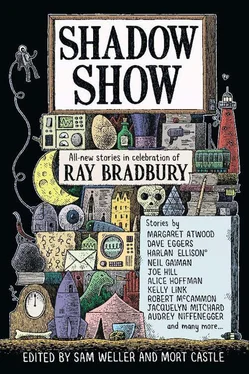Sharon was not a good runner. She was chunky. Borderline fat. Increasingly, that had begun to irritate her father—he had started commenting on her food intake, turning the family dinner table into a very tense place—but Sharon’s size didn’t seem to bother Hayleigh at all. Sharon, in fact, was the opposite of Samantha Bollinger in lots of ways. Samantha was quiet, and Sharon was talkative. Samantha had been a “poor-to-average” student—that was a phrase Sharon had overheard when two teachers were chatting about Samantha one day, and she loved its suggestion of shabbiness, of hopeless mediocrity—while Sharon excelled in her classes. Sharon was “bright,” a word that several of her teachers had used when referring to her. She liked English and math and science. She was fascinated by rockets and space travel. Also atomic energy.
Maybe, Sharon thought, Hayleigh appreciated the contrast. Maybe she’d been secretly tired of Samantha Bollinger and her perfect stride and the way she’d sit in class, the knees of her long legs bumping up against the bottom of the desk, her face glazed with incomprehension, not even bothering to pretend she understood what the teacher was saying. Sharon always pretended, even if she was lost. She wasn’t lost often, but when it happened, she still leaned forward, still looked bright and earnest and eager. Her theory was that if you looked like you got it, sooner or later, you’d get it.
When Sharon told Hayleigh’s dad about that theory, Ed Westin had laughed and said, “Fake it till you make it, sweetie, fake it till you make it!” He seemed proud of her, as if for the moment she was actually his daughter, his flesh and blood, which gave Sharon a funny little flutter in her stomach. It wasn’t a bad feeling at all. She worried at first about the disloyalty to her own family, but then she just let go and enjoyed the feeling. It was like riding your bike barefoot on a summer day: You knew you weren’t supposed to do it, because it was dangerous—if you caught a toe in the spokes, there’d be a bloody mess—but it felt so good and so free that you did it anyway.
Hayleigh’s dad had to leave. He was supposed to stay there Saturday morning while Sharon and Hayleigh played—that was the deal, that was the arrangement, that was what Sharon had told her mom before she left her house— Hayleigh’s dad is gonna be there the whole time, geez, it’s fine —but now he had to go.
Sharon could tell he didn’t want to, but he had no choice.
He had called his boss to check on a job. That’s when he got the bad news. It was about the wiring. Somebody else had done something wrong, another electrician had “screwed up royally,” according to what Hayleigh’s dad was saying into his cell phone. His voice was crisp and businesslike, even though he had just described himself to his boss as “really, really pissed off.” Hayleigh and Sharon listened avidly to his end of the call.
“Okay,” Hayleigh’s dad was saying. He was pacing, holding the cell with one hand, scratching the back of his head with the other. “Okay. Okay, Roy. Yeah. I think I can get it done. But you tell everybody else to back off, okay? Don’t mess with it. I’m on my way.”
He flipped his cell shut and looked down at Hayleigh and Sharon. They were stretched out on the floor of the living room. They were just hanging out, which was typical for a Saturday.
Hayleigh had assured Sharon—so that Sharon in turn could assure her mom—that her dad would stick around, would keep an eye on them. It was silly, really; they were plenty old enough to stay by themselves. And sometimes, for short periods of time, they were allowed to. When Hayleigh came over to her house, for instance, Sharon’s mom would sometimes leave for a little while to pick up stuff at the dry cleaners, and that was okay. Sharon wasn’t sure the Westins ever left stuff at the dry cleaners, the way the Leinarts did every single week, because, Sharon knew, her dad’s shirts and suits had to be dry-cleaned perfectly and he could be “a real prick about it,” which was the phrase Sharon had heard her mom use once, when she didn’t know Sharon was listening.
“It’s just for a little while,” Hayleigh’s dad was saying to them. “An hour, maybe. Hour and a half, tops. We’ve got this big project out by the mall—you’ve seen it, right? The office park? Well, some friggin’ idiot put the breakers in wrong, and the whole thing’s arcing and sparking.”
Sharon was impressed. Her father would never have said “friggin” in front of her. Nor would he expose the sort of passion that Ed Westin was showing. Ed Westin cared about his job, about things being done the right way. Sharon could tell. He had once worked for NASA, Hayleigh had told Sharon, and she said it casually, but they both knew how cool that was. He’d been in the U.S. Navy at the time, and he and his crew had been called in to do some electrical work on one of the space shuttles. He didn’t talk about it, but when Sharon looked at his hands, she could imagine it: Hayleigh’s dad, twisting wires, checking connections, then nodding at somebody and giving the thumbs-up sign. He made sure everything would work perfectly in outer space.
“So it won’t take me very long,” he said. “I’ll be back before you know it. Way before lunchtime. I promise.”
He was looming over them, frowning, like he wasn’t quite sure. Hayleigh and Sharon were lying on their stomachs on the living room carpet, their chins propped up on their palms. They’d been watching TV—it was a rerun of Buffy the Vampire Slayer , which Sharon was not allowed to watch at home, a fact that added a special bit of deliciousness to the show—when Hayleigh’s dad came into the room, talking on his cell. Hayleigh had politely turned down the volume on the set during her father’s call.
“You girls’ll be okay, right?” he said. He looked dubious. Sharon could see how torn he was, torn between two kinds of duty.
“Sure, Dad,” Hayleigh said. She didn’t elaborate, didn’t ridicule his concerns. Sharon took note: Hayleigh didn’t overplay her hand. Too much reassurance was always a red flag for a parent. Hayleigh, Sharon had to concede, was pretty smart. Not book-smart—that was Sharon’s specialty—but smart when it came to dealing with parents.
“Okay,” he said.
Then came the warning. “But no playing in the basement, you two,” Hayleigh’s dad added. “Absolutely, positively not. Okay?”
Bored nods from both of them. Hayleigh didn’t even take her eyes from the TV screen, which Sharon thought was another nice touch. On the screen, Buffy had just karate-kicked a bad vampire.
“Never, never, never play in the basement. Got it?” Hayleigh’s dad went on. “Are we clear on that, girls?”
Sharon nodded again, but Hayleigh—unexpectedly clever Hayleigh!—looked up at her father as if she’d forgotten he was even there, so absorbed was she in the plot of the Buffy episode. They were so wrapped up in the drama that, chances were, Hayleigh’s dad would leave and return without either girl having moved an inch from her spot right here on the living room floor. Frankly, Hayleigh’s expression implied, there was zero chance that they would even think about the basement, much less venture down there. They were far too preoccupied to remember that the basement even existed .
The girls continued to stare at the TV screen while Hayleigh’s dad foraged for his truck keys and his dark blue windbreaker and his red baseball cap with COZAD BROS woven in cursive white letters across the crown. As he pulled open the front door, still looking a bit worried, he said, “See you later, girls. If you need me, I’ve got my cell,” and they grunted back at him, which, here in Hayleigh’s house, constituted an acceptable reply but in her own house, Sharon knew, would not have been tolerated. And then he was gone.
Читать дальше



![Lord Weller - Ритера или опасная любовь [СИ]](/books/421202/lord-weller-ritera-ili-opasnaya-lyubov-si-thumb.webp)








